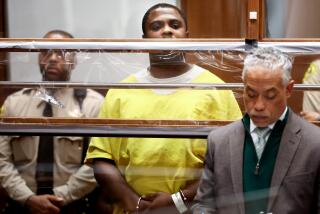Lawyer-Client Affair Cited in Plea for Mercy
- Share via
ST. LOUIS — Marianne Marxkors has visions of Reginald Powell strapped to a gurney, waiting for the injection of drugs that will kill him.
And she can’t help but feel partly responsible.
Marxkors was Powell’s trial lawyer and, after his conviction, his lover. She now admits she should have advised him to accept a plea bargain that would have kept him off death row.
But her emotions got in the way of her judgment.
Powell is scheduled to be executed Wednesday for stomping and stabbing two brothers to death in 1986.
“I don’t want him to be there alone,” Marxkors said, wiping tears off her cheeks. “I can’t imagine having all these people staring at you and not seeing one face of somebody who cares.”
Powell’s current lawyer, Bruce D. Livingston, has asked Gov. Mel Carnahan to commute the sentence, claiming that Marxkors’ relationship with Powell kept her from providing an adequate defense.
“It’s so shocking,” Livingston said. “Everything in this case is a pathetic tragedy.”
Court records show Powell, now 29, grew up virtually without parental supervision in rough St. Louis neighborhoods. One test put his IQ at 65. He ran away from home at 10, and tried to kill himself at 14.
Powell was high on PCP and drunk on Nov. 14, 1986, but wanted more alcohol. He crossed paths with brothers Freddie L. Miller, 39, and Lee Arthur Miller, 29. Powell was 18 and underage for buying liquor, so he asked the brothers to get some for him. They refused.
Later that day, Powell and a group of friends again came across the Miller brothers.
This time, Powell jumped on both men so hard, he broke nearly all of their ribs. Then he stabbed both brothers to death and robbed them of $3 and a pack of cigarettes.
In his confession, Powell showed little remorse.
“You know, we’ll say I had the last--the last laugh,” he said.
Marxkors, now 45, was a public defender who had never taken a death penalty case to trial until she got the call to serve as Powell’s attorney.
They were nearly complete opposites. She was an educated, white, 30-something lawyer. He was a borderline retarded black man.
Despite the horrific crime, Marxkors was taken in by Powell’s kindness.
She said she began falling in love with him long before they first had sex--in a holding cell near a St. Louis courtroom.
“It was all emotion,” she said. “I felt so alone and so vulnerable, and I guess he did. And we had each other.”
Marxkors admitted her affection led to a crucial mistake when she turned down a plea agreement from prosecutors: Life in prison with the chance of parole in exchange for a guilty plea.
Marxkors said she thought she could somehow get Powell off on a manslaughter conviction.
Livingston called her decision “preposterous.”
“Prosecutors didn’t want to kill this guy,” he said.
Powell didn’t think to question Marxkors’ judgment.
“I didn’t know nothing about no law,” he said in a telephone interview from the Potosi Correctional Center. “I was just as blind as a newborn baby coming into the world. I did what she asked me to do because she was the lawyer.”
Livingston also questioned Marxkors’ refusal to advise Powell to testify at the penalty phase of the trial.
She now says she should have. But at the time, she feared that his improved demeanor--he was off drugs--would hurt their claim that he was mentally impaired at the time of the murders.
“I at least wanted a chance to beg for my own life,” Powell said.
The affair became public when prison guards caught Marxkors and Powell having sex during one of her visits. An investigation found some lurid love letters from Marxkors in Powell’s cell.
Atty. Gen. Jay Nixon said the revelation doesn’t change the facts of the case, adding that the courts have upheld the death sentence.
“It’s certainly a lot more due process than Powell gave his victims,” he said.
Marxkors, never disciplined for the relationship, now only dabbles in law, handling a few traffic cases. She works in child care and is studying for a degree in social work.
She still writes Powell and visits him twice a week.
“Am I in love with him? Part of me wants to think I’m not. I don’t know,” she said. “We’re like soul mates.”
She paused, sobbing.
“They can take him, but we’ll still have that.”
More to Read
Sign up for Essential California
The most important California stories and recommendations in your inbox every morning.
You may occasionally receive promotional content from the Los Angeles Times.












